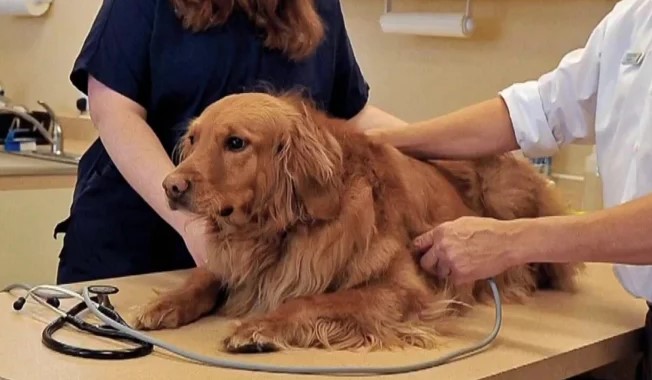Breathing Easy: How to Support Your Dog’s Respiratory Health
Welcome, dog lovers! We all know that our furry friends bring so much joy and happiness into our lives. They wag their tails, lick our faces, and always seem to be full of energy. But have you ever stopped to think about your pup’s respiratory health? Just like us humans, dogs can also suffer from respiratory issues that can affect their overall well-being.In recent years, there has been a growing concern about a mysterious dogs respiratory illness spreading across the country. Pet owners are worried sick about their fur babies falling victim to this unknown ailment. But fear not! In this blog post, we will delve into the depths of this mystery illness and explore ways in which you can support your dog’s respiratory health.So grab a cup of tea (or perhaps a treat for your four-legged friend) and join us as we uncover the secrets to keeping your canine companion breathing easy. Let’s get started!
Understanding the Mystery Dog Respiratory Illness
The mystery dogs respiratory illness has left pet owners puzzled and concerned. This illness, which seems to be highly contagious, is characterized by symptoms such as coughing, sneezing, nasal discharge, and difficulty breathing. Dogs of all ages and breeds can be affected.
The cause of this illness remains a mystery. Experts are currently investigating various possibilities including viral infections, bacterial infections, environmental factors, or a combination of these factors. However, no definitive answers have been found yet.
What makes this illness even more perplexing is its widespread nature. Reports of cases have been pouring in from different parts of the country. It’s important for dog owners to stay informed about the signs and symptoms so that they can take appropriate action if their furry friend falls ill.
Remember to keep an eye out for any unusual respiratory symptoms in your beloved pooch and consult with your veterinarian if you have any concerns. Stay tuned as we explore further into this mysterious ailment and discover ways to support your dog’s respiratory health!
The Scope of the Problem: Where and How Widespread Is It?
Dogs respiratory illness is a matter of concern for pet owners everywhere. But just how widespread is this problem? Unfortunately, it’s difficult to pinpoint the exact scope of the issue due to various factors. However, reports suggest that respiratory illnesses in dogs are on the rise across different regions and breeds.
The prevalence of dog respiratory illness can vary from one location to another. Urban areas with high population density and pollution levels may have a higher incidence rate compared to rural or less polluted environments. Additionally, certain geographical regions may be more prone to specific types of respiratory infections or diseases.
Furthermore, the spread of these illnesses among dogs can also depend on factors such as climate conditions and exposure to contagious agents. For example, during colder months when dogs spend more time indoors in close proximity to each other, there might be an increased risk of transmission.
Dog respiratory illness While it’s challenging to determine the exact extent of this problem, it’s crucial for dog owners worldwide to remain vigilant about their pets’ respiratory health and seek prompt veterinary care if any symptoms arise. By staying informed and proactive, we can work towards minimizing the impact of these illnesses on our furry friends’ well-being.
Possible Causes of the Illness
When it comes to respiratory illness in dogs, there are several potential causes that pet owners should be aware of. One possible culprit is environmental factors such as pollution or exposure to irritants like smoke or dust.Dog respiratory illness Dogs with weakened immune systems may also be more susceptible to respiratory issues.
Another potential cause could be infectious agents such as viruses or bacteria. Just like humans, dogs can catch colds and other respiratory infections from their furry friends at the park or even from shared toys and water bowls.
Certain breeds may have a predisposition to respiratory problems due to anatomical factors. Breeds with short snouts, like bulldogs and pugs, often experience breathing difficulties because their airways are narrower than those of other dogs.
Understanding these possible causes can help dog owners take proactive measures to protect their pets’ respiratory health. It’s important to keep your dog’s environment clean and free from pollutants, regularly wash their bedding, and avoid exposing them to secondhand smoke. Additionally, regular vet check-ups and vaccinations can help prevent some common respiratory illnesses.
Identifying Symptoms of Respiratory Issues in Dogs
When it comes to our furry friends, their health and well-being are always top priorities. One important aspect of their overall health is respiratory function. Dogs can experience a range of respiratory issues, so being able to identify the symptoms is crucial.
Keep an eye on your dog’s breathing patterns. Rapid or labored breathing could be signs of an underlying problem. Pay attention to any coughing or wheezing as well, as these can indicate respiratory distress.
Watch out for changes in appetite or energy levels. If your dog suddenly becomes lethargic or loses interest in food, it may be a sign that something is amiss with their respiratory system.
Observe any nasal discharge or difficulty swallowing. These symptoms can point towards infections or blockages in the airways.
Remember that every dog is unique and might exhibit different signs when dealing with respiratory issues. If you notice anything unusual about your canine companion’s breathing, consult with a veterinarian for proper diagnosis and treatment options
Taking Action: What Should Dog Owners Do?
Dog owners play a crucial role in supporting their furry friends’ respiratory health. If you suspect your dog may be experiencing respiratory issues, it’s important to take prompt action. Observe your dog closely for any signs of difficulty breathing, coughing, sneezing, or nasal discharge. These symptoms could indicate an underlying respiratory illness and should not be ignored.
Once you’ve identified potential symptoms, the next step is to seek veterinary care. Schedule an appointment with your veterinarian as soon as possible. They will perform a thorough examination and may recommend diagnostic tests such as bloodwork or X-rays to further evaluate your dog’s condition.
In addition to seeking professional help, there are some measures you can take at home to support your dog’s respiratory health. Keep their living environment clean and free from irritants like dust and smoke. Avoid exposing them to secondhand smoke or areas with poor air quality. Additionally, ensure they have regular exercise but avoid strenuous activity that could put strain on their lungs.
Remember, taking action promptly can make a significant difference in managing respiratory illnesses in dogs. By working closely with your veterinarian and providing a healthy environment for your pet, you can help them breathe easy and enjoy optimal respiratory health.
Preventive Measures for Respiratory Health
The Importance of Respiratory Health for Dogs
Maintaining good respiratory health is crucial for your furry friend’s overall well-being. Just like humans, dogs can suffer from various respiratory issues that can greatly impact their quality of life. From allergies and infections to chronic conditions like asthma or bronchitis, it’s essential to take preventive measures to support your dog’s respiratory health.
Tips for Maintaining Clean Air and Environment
One way to promote good respiratory health is by ensuring a clean and allergen-free environment for your canine companion. Regularly dusting and vacuuming your home can help remove potential irritants such as pollen, dust mites, and mold spores. Additionally, avoiding smoking around your dog and using pet-friendly cleaning products can further reduce the risk of respiratory distress.
How Vaccinations and Regular Vet Check-ups Can Help
Vaccinations play a vital role in protecting dogs against contagious diseases that could affect their respiratory system. Regular vaccinations recommended by your veterinarian not only safeguard against common illnesses but also help prevent complications that may arise from these conditions. Routine check-ups allow vets to assess lung function, monitor any changes in breathing patterns, and provide early intervention if necessary.
Remember, keeping an eye on your dog’s overall well-being will contribute significantly to maintaining their healthy lungs and airways. By taking proactive steps towards preventing respiratory issues through clean environments, proper vaccinations, regular vet visits – you’re ensuring that they breathe easy for years to come!
The Importance of Respiratory Health for Dogs
Having good respiratory health is crucial for dogs. Just like humans, dogs rely on their lungs to breathe in oxygen and exhale carbon dioxide. This process is essential for delivering oxygen to the body’s cells and removing waste products. Without proper respiratory function, a dog may struggle with breathing difficulties, reduced energy levels, and overall poor quality of life.
Maintaining clean air and environment can significantly impact a dog’s respiratory health. Dogs are highly sensitive to pollutants such as dust, smoke, and chemicals found in cleaning products or air fresheners. Regularly vacuuming your home, using pet-friendly cleaning products, and avoiding smoking indoors can help reduce exposure to these irritants.
Regular vaccinations are another important aspect of supporting your dog’s respiratory health. Vaccinations protect against common diseases that can affect the respiratory system, such as canine influenza or kennel cough. Additionally, scheduling regular check-ups with your veterinarian allows them to monitor your dog’s overall health and catch any potential respiratory issues early on.
Engaging in activities that promote physical fitness can also benefit a dog’s breathing capacity. Regular exercise helps strengthen the muscles involved in respiration while improving lung function. Providing opportunities for mental stimulation through puzzle toys or training exercises can reduce stress levels which could indirectly impact a dog’s ability to breathe comfortably.
Taking steps to prioritize your dog’s respiratory health is an important part of being a responsible pet owner. By maintaining clean air within their environment, ensuring they receive necessary vaccinations and veterinary care regularly, as well as engaging them in activities that promote physical fitness – you’re giving them the best chance at living a happy and healthy life!
Tips for Maintaining Clean Air and Environment
Maintaining clean air and a healthy environment is crucial for supporting your dog’s respiratory health. Here are some tips to help you keep the air around your furry friend fresh and pure.
Ensure proper ventilation in your home. Open windows regularly to allow fresh air to circulate, reducing the accumulation of dust, allergens, and other pollutants. Additionally, using an air purifier can effectively filter out airborne particles that may irritate your dog’s respiratory system.
Be mindful of cleaning products and chemicals used in your home. Opt for pet-friendly alternatives that are free from harsh ingredients or strong fragrances which can trigger respiratory problems in dogs. Regularly dusting surfaces and vacuuming with a HEPA-filtered vacuum cleaner will also help minimize allergens in the environment.
Maintain a clean living space by regularly washing bedding, blankets, and toys that may harbor allergens or irritants. Keep floors swept or mopped to reduce dust buildup and consider keeping indoor plants that naturally purify the air.
By implementing these simple tips into your daily routine, you can create a safer and healthier environment for your beloved canine companion!
How Vaccinations and Regular Vet Check-ups Can Help
Regular vaccinations and veterinary check-ups are essential for maintaining your dog’s respiratory health. Dog respiratory illness Vaccinations help prevent the spread of common respiratory illnesses among dogs, such as kennel cough and canine influenza. These vaccines stimulate your dog’s immune system to produce antibodies that fight off specific pathogens, reducing their risk of developing severe respiratory infections.
During routine vet check-ups, your veterinarian will carefully examine your dog’s lungs and airways to ensure they are functioning properly. They can also listen for any abnormal sounds or signs of congestion that may indicate a respiratory issue. Early detection is crucial in treating these conditions effectively.
In addition to vaccinations and check-ups, veterinarians may recommend additional preventive measures based on your dog’s breed, age, lifestyle, and environment. This could include prescribing medication for allergies or providing guidance on managing indoor air quality through proper ventilation systems or avoiding exposure to environmental pollutants.
By staying proactive with regular vaccinations and vet visits, you can significantly reduce the risk of respiratory dog respiratory illness in your furry friend. Remember to discuss any concerns or changes in your dog’s breathing patterns with your veterinarian promptly. Together, you can ensure that your beloved pet enjoys optimal respiratory health throughout their life.
Lifestyle Factors and Activities to Support Respiratory Health
Maintaining a healthy lifestyle is crucial for supporting your dog respiratory illness. Here are some lifestyle factors and activities that can help keep their lungs strong and clear.
Exercise plays a vital role in promoting good respiratory health. Regular physical activity helps improve lung function, strengthens the muscles involved in breathing, and reduces the risk of respiratory conditions. Take your furry friend for daily walks or engage them in playtime to keep those lungs working well.
Be mindful of your dog’s environment. Avoid exposing them to secondhand smoke as it can harm their delicate respiratory system. Additionally, try to minimize exposure to air pollution by walking them away from busy roads or industrial areas whenever possible.
Maintaining a balanced diet is crucial for overall health, including respiratory well-being. Provide your dog with high-quality food that contains essential nutrients like vitamins C and E, which support lung function and reduce inflammation.
By incorporating these lifestyle factors into your routine, you can actively contribute to supporting your beloved pup’s respiratory health!
Conclusion: Caring for Your Dog’s Breathing
Caring for your dogs respiratory illness is an essential part of being a responsible pet owner. By understanding the potential risks and taking proactive measures, you can help safeguard your furry friend against respiratory illnesses.
Remember, prevention is key. Maintaining a clean and healthy environment, keeping up with vaccinations and regular vet check-ups, and incorporating lifestyle factors that support respiratory health are all crucial steps in ensuring your dog breathes easy.
So take the necessary precautions to create a safe space for your beloved companion. With proper care and attention, you can provide them with the best chance at leading a happy, healthy life free from respiratory issues. Your furry friend will thank you for it!







